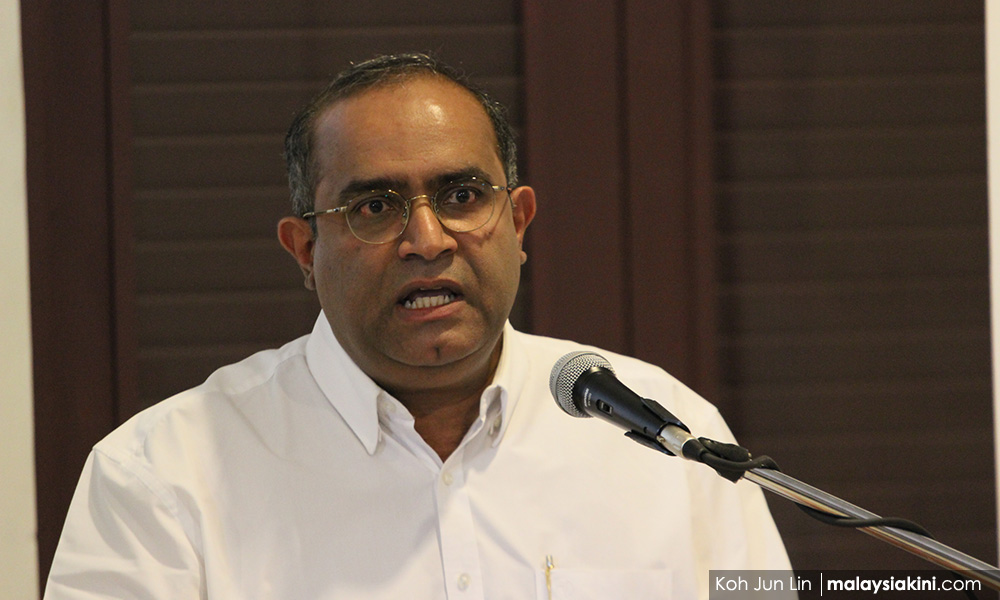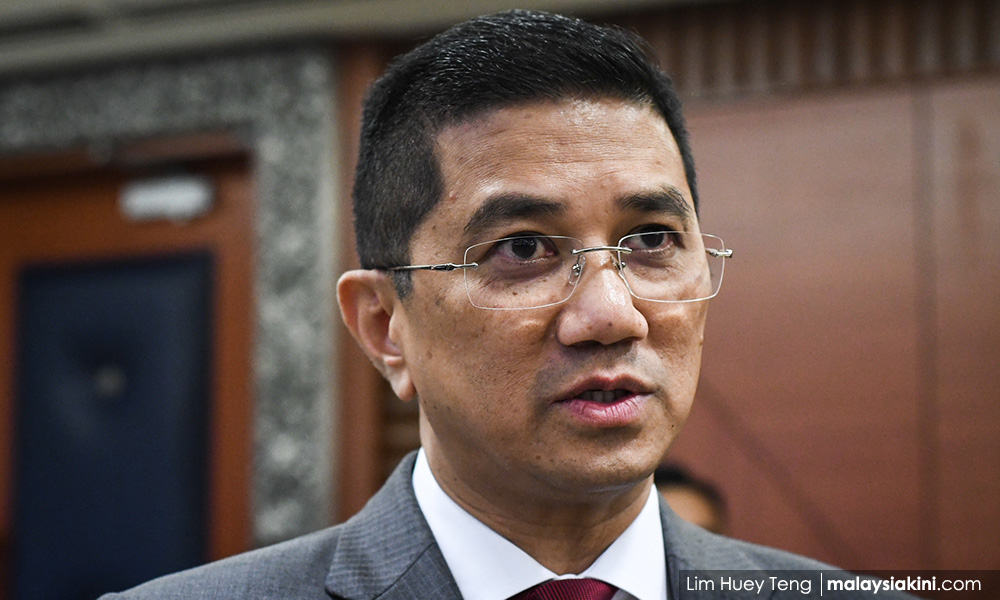
100 DAYS | By highlighting the rising cost of living and the corruption under the previous government, Pakatan Harapan generated significant support in GE14 and successfully overthrew BN after the latter's 61 years in power.
While the new government has abolished the GST and reopened the 1MDB investigations in their first 100 days in power, economist Soon Hoh Sing says the new government still has no clear direction with regards to the economy. Instead, he said they seem to be more populist than far-sighted.
“There are only a few populist plans to benefit the people. For example, the people can enjoy a few months of a tax holiday. Strictly speaking, this is not even a policy and of course not a long-term policy. If you are talking about real policy, we can’t see any clear direction from the Harapan government so far.”
Soon said the new government had no choice but to abolish the goods and services tax (GST) because it was their election promise. However, he believed that re-implementing the sales and services tax (SST) system was just a “transitional plan” and not a long-term policy of the government.
“I think the Harapan government should resume the GST system eventually. If GST is considered to be problematic, it is not because of the tax system itself.”
“Actually the government can increase the threshold of taxable turnover of the GST system or lower the tax rate or narrow the scope of taxation. In the long run, the GST system is more ideal than the SST system because it is relatively more modern and effective.”

While the GST has the imperfection of being a regressive tax, meaning the poor pay more percentage of their income than the rich, Soon suggested that the government can offset the regressive effect by having targeted subsidies for the poor.
On the new government stabilising petrol prices by re-implementing the petrol subsidy, Soon agreed that the subsidy could reduce the cost of living in the short term but he still considered this a populist and short-sighted policy.
“Mainstream economists are of the opinion that the government should save the money from the petrol subsidy and use it in a productive way [...] they can use it to invest in something that can bring returns in the future.”
He pointed out that the insufficiency of public transportation has led to excessive car ownership in the country, hence the government should spend more money on investing in public transportation instead of subsidising fuel.
He suggested that this will eventually relieve the people of the economic pressure of buying cars and paying for fuel.
Soon, author of the 2010 book "The embarrassing Malaysian economy", reminded that the GST scheme was initiated because the tax-paying population was too small and the government's tax revenue insufficient.
He proposed the Harapan government come out with a long-term economic policy to increase the income level as otherwise the GST would have to be reimplemented someday.
“Why was the GST scheme introduced? As Malaysia has a working population of 14 million, only 15 percent of them pay income tax. Thus, the government needs to introduce GST to increase the government’s revenue because the tax-paying population is too small.”
“This is the crux of the whole problem. If the proportion of personal income tax in government revenue cannot be raised, then in the long run, the government must re-implement the GST system unless the government follows developed countries in imposing property tax.”
As the tax systems is only one of the factors for the rising cost of living, Soon said the change of tax systems can’t solve the issue. To reduce the high cost of living, he suggested the government have targeted subsidies to the Bottom 40 (B40) group and also build more affordable and conveniently located low-cost housing.
On minimum wage, Soon viewed its implementation as “politically correct” but not “economically correct”. The cost of production will rise with a minimum wage and the cost of living will also increase as the merchants will past on their costs to the consumers.
He said the new government should focus on creating employment opportunities and improving labour productivity instead of solely relying on the export of raw material to create wealth. He also noted that sufficient wealth should be first created before the distribution of this wealth can be discussed.
Deal with distributive justice
PSM central committee member Choo Chon Kai (photo) held a different view on this. Choo was of the opinion that labour productivity in Malaysia has been improving continuously and that distributive justice was important at the current stage.

“We have been discussing how to enlarge the cake since the 1980s, but we have not considered the issue of distribution and the gap between the rich and the poor has widened. Thus, the government must deal with the issue of distribution now. A fairer distribution will improve the economy.”
Choo explained that a higher minimum wage will enhance the purchasing power of the bottom-level working population thereby activating the local market. In addition, when the minimum wage standard is gradually increased, the taxpayer population will also increase and the government will have more tax revenue to develop the infrastructure which will lead to a “virtuous” cycle of the economy.
Commenting on the new government's performance, political economics professor Dr Edmund Terence Gomez pointed out the Harapan government had fulfilled various promises such as abolishing the GST, eliminating the blacklisting policy of PTPTN loan repayment, reopening the investigation into 1MDB among others and it deserved recognition for all this.
However, while the new administration took action on 1MDB as soon as they came to power, Gomez questioned why they didn’t treat the scandals at Felda, Mara and Tabung Haji with equal urgency.
“After they immediately set up a committee for 1MDB, why didn't they do the same for these other cases? ”
He stressed that Felda, Mara and Tabung Haji were important institutions which had some serious problems including allegations of corruption so the government should look into these cases with the same level of attention it gave 1MDB
As for government-linked companies (GLCs) and government-linked investment companies (GLICs), Gomez noted they were the main players in the Malaysian stock market and being involved in various fields such as banking, energy, construction and health, they affected the citizens’ daily lives.

He believed that the original intention of the establishment of GLCs was to help the poor and to promote industrialisation but they had now become “big monsters” holding great wealth in their hands. Therefore, he said a critical review of the role of GLCs was now crucial.
“We created GLCs to help the poor but instead they have become very rich, they have become monsters. They are not doing what they are supposed to do.”
“The question is, to what extent should the government be in the market through GLCs? This is a debate the country must have.”
He pointed out GLCs had been accused of crowding out the private firms and the government should look into this by doing research to confirm whether this was discouraging investment from entering the market.
Gomez also mentioned that since Mahathir said sovereign wealth fund Khazanah Nasional had strayed from its objective of enriching the bumiputera, the government needed to sort out the relationship between GLCs and bumiputera equity ownership.
“What exactly is the role of GLCs when it comes to its relationship with bumiputera and bumiputera equity ownership? This is an important question that we have to ask and address because that will shape our investment patterns and the economy.”
'Japan today not Japan of 80s'
Besides reviewing the role of GLCs, Gomez also pointed out that we should discuss if any politician should be on the board of directors for GLCs.
He said he was not comfortable with the decision of appointing Prime Minister Dr Mahathir Mohamad and the Economic Affairs Minister Mohamed Azmin Ali to the board of Khazanah as Pakatan Harapan clearly stated that they wouldn't do that.

“If the prime minister and the economic affairs minister sit on the board of directors of GLCs, it is very unlikely that other board members will challenge them. I’m not comfortable with this.”
Gomez further questioned why the government didn’t give any explanation when they decided to set up a new ministry, economic affairs, and to transfer various important GLCs to it from the finance ministry.
He stressed the government should look at the GLCs from multiple angles including investigating corruption cases, reviewing their role in the market and whether politicians were suitable to serve in them. The government should also explain its reason for transferring management of GLCs between ministries.
“Under the new government, we expect to see more accountability and transparency in the governance of GLCs but so far we haven’t seen enough of that,” Gomez added.
As for mega-projects, Mahathir announced the abolishment of the MRT3 project and that the government was not reviewing the ECRL project while the HSR was still under discussion.
At the same time, the second time prime minister repeatedly expressed his wish to start another national car project, the nation's third.
Soon viewed a third national car project as a definite “fail” noting that the global automotive industry was gradually merging.
“The competitiveness of Perodua is stronger than that of Proton because it cooperates with Daihatsu which is backed by the Toyota Group.”
“If the third national car company is not supported by any big group, please don't engage in the automotive industry […] it is impossible for us to compete with the big groups.”
He reminded that a failure of another national car project may eventually return to burden local consumers contrary to the vision of the Harapan government.
Soon also observed that Mahathir may have intentionally used the power of Japan to stabilise the Malaysian economy but he believed this move was too optimistic and somewhat outdated.
“Japan today is no longer the Japan of the 1970s or1980s. Today, Japan has their own difficulties which are even more serious than Malaysia's. Mahathir may still be thinking in the 1970s or 1980s. Learning from the East then was a right choice but now it is outdated.”
On bumiputera affairs, Azmin has announced that the government will be holding a congress to discuss steps to strengthen their economic status while at the same time ensuring distributive justice for other ethnicities.
Soon said that as there was no clear economic direction at the national level, it was difficult to comment. However, he said if the new government went back to the approach of affirming bumiputera rights and privileges in economic policy, it would be worrying.
“Azmin said that the government will review the direction of economic policy. If they go back to the old path of the New Economic Policy, it would be awful. If the government still wants to focus on bumiputera equity, then Malaysia’s economic prospects will be bleak.”
He also said while the new government promised to implement an open tenders system in accordance with the principle of transparency, he had some reservations over this.
He said this was because if the new economic policy affirmed the need to create a bumiputera commercial and industrial class, he doubted that how open tenders for contracts could be conducted.
“In fact, the government's approach to assisting bumiputera is to award projects to them. And when they award the projects, everyone tacitly quotes inflated numbers. How will the government invite tenders openly and transparently? We don’t have to make a conclusion too early but we will wait and see.” - Mkini


No comments:
Post a Comment
Note: Only a member of this blog may post a comment.